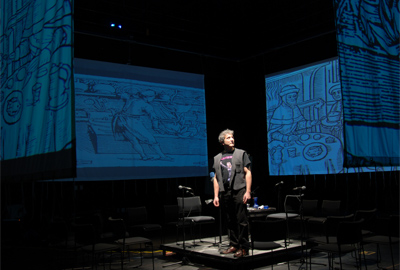Conference on Semantic Computing to Tackle New Technologies, Bring Together Industry and Academia
CREL's Dubnov to Lead Workshop on Semantic Computing in Edutainment
San Diego, May 17, 2013 -- Semantic computing goes beyond data to explore meaning through what you can do or feel about something, as opposed to simply retrieving information on a given topic. Researchers in the arts are drawn to this new computing paradigm.
|
On September 19, 2013, Dubnov will chair a day-long Tutorial and Workshop on Semantic Computing in Edutainment. It will be held in conjunction with the Seventh IEEE International Conference on Semantic Computing (IEEE-ICSC), which is scheduled for September 16-18, 2013, in Irvine, Calif.
“Recent advances in technology have provided us with so many more opportunities to expand the edutainment genre,” said Dubnov, who directs the Center for Research in Entertainment and Learning (CREL), based in Calit2’s Qualcomm Institute at UC San Diego. “Those advances include such media as new audio techniques and increased, three-dimensional video options.”
In the half-day tutorial, Dubnov will provide an overview of the problems faced by the edutainment industry today, and he will outline some applications of semantic technologies to solving these problems.
Edutainment is a communications genre that combines educational initiatives and entertainment, with the aim of enhancing the learning experience and reaching new audiences by providing educational and creative content in a fun, unconventional way. Edutainment has appeared for many years in children’s television shows -- think Mr. Wizard's World, Sesame Street and Where in the World Is Carmen Sandiego? -- and “learning”-type video games, but Dubnov argues that the genre has begun moving past its standard definition and now has a broader role to play. “As educators, artists and researchers,” Dubnov noted, “we can work to bring new technologies into the classroom, into the studio, and into a variety of academic settings that tend not to be explored through more traditional instructional techniques.”
At the core of these advances in edutainment is academia’s ever-increasing support of the field of semantic computing. Matching computational content to the user’s needs involves a number of complex, computer-focused technologies, including natural language processing, multimedia, and machine learning, with the shared goal of developing user interfaces capable of communicating ideas and intentions via data management and manipulation as well as content creation. According to Dubnov, the semantics-computing workflow in edutainment may lead to new techniques for linking film and music and for improving the storytelling experience, among others.
For many inside and outside of the university environment, the merging of industry and academia is seen as key to the future success of semantic computing in edutainment and, more generally, as a field in itself. In support of such collaboration, Dubnov and fellow researchers Mihaela van der Schaar (UCLA) and Phillip Sheu (UC Irvine), both co-chairs of the September conference, recently submitted a funding request to the National Science Foundation to establish an Industry/University Collaborative Research Center on Semantic Computing; such a center would tie artificial intelligence, signal processing, and other computing technologies together through an integrated theme, with benefits to academia and industry alike.
According to Dubnov, industry partners such as Movie Cloud, which seeks to use new semantic technologies to change how films are produced and distributed, and Ableton (which does the same for music) are expected to participate in the September edutainment workshop and the broader IEEE-ICSC.
“Semantic- and content-based retrieval technologies are important to the future of multimedia communications, both in industry and academia,” Dubnov said. “We expect that the edutainment workshop and the main semantic computing conference will really demonstrate how far these semantic-computing technologies have come, and how they can be used to further bridge these two environments for the benefit of people across the globe.”
Conference and Workshop Details
The Workshop on Semantic Computing in Edutainment (TWSCE 2013) has invited paper submissions on a wide set of topics, including: Computational Media Aesthetics; Film and Music Syntax and Semantics; Story Narrative Modeling and Analysis; Meta-Creation and Generative Media; Authoring and Learning with User Generated Content; Multi-Format and Multi-layered Media Management; Time-Based Interactive Multimedia Scenarios; Cross-Media Semantic Associationl; Context-Aware Media Semantics; Collaborative and Crowd-Sourced Authoring; as well as Semantic Interfaces and Mediation Technology. Key dates include:
June 10 – Deadline for workshop paper submissions
June 30 - Notification of paper acceptances
The wider Seventh IEEE International Conference on Semantic Computing is co-chaired by David A. Evans (Evans Research), Mihaela van der Schaar (UC Los Angeles), and Phillip Sheu (UC Irvine). Scheduled keynote speakers are Aaron Brown (Google, Inc.) and Dennis E. Wisnosky (formerly U.S. Dept. of Defense). Conference deadlines are as follows:
May 31 – Regular/short/poster paper and demonstration descriptions due
June 10 -- Industry session paper submission
Media Contacts
Program Contact: Shlomo Dubnov, 858-534-5941, sdubnov@ucsd.edu
Media Contacts: Emily Bass, edbass@ucsd.edu or Doug Ramsey, 858-822-5825, dramsey@ucsd.edu
Related Links
Seventh IEEE International Conference on Semantic Computing
Tutorial and Workshop on Semantic Computing in Edutainment
Center for Research in Entertainment and Learning


